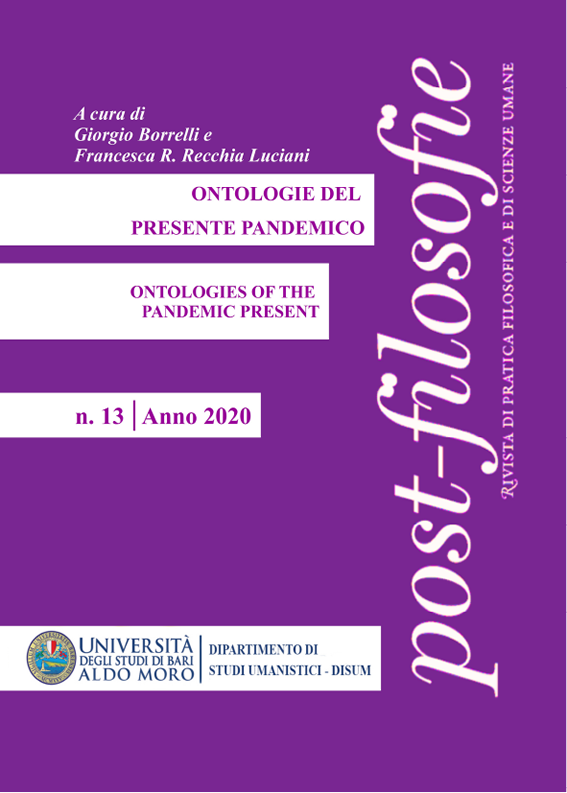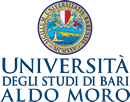Filosofia e vita in Lessing
DOI:
https://doi.org/10.15162/1827-5133/1271Parole chiave:
Lessing, Leibniz, Kant, maieutic, freedom, transforming practice, maieutica, libertà, prassi trasformatriceAbstract
Facendo una ricerca su “Filosofia e vita nel pensiero classico tedesco”, vorrei riflettere sul significato pratico che Gotthold Ephraim Lessing ha dato alla filosofia. Pensare correttamente è già di per sé un’azione virtuosa. L’azione pratica deve essere diretta alla realizzazione dei diritti umani, al compimento di un’umanità al sicuro da abusi e ingiustizie. La filosofia emerge come una pratica che culmina nell’unione di pensiero e azione. Ma cosa significa qui pratica? Per rispondere a questa domanda, saranno delineati tre significati diversi e interconnessi della filosofia come pratica:
a. La filosofia è una pratica maieutica;
b. è una pratica di trasformazione, poiché si struttura come catharticus dei propri pregiudizi ed errori e come fermenta cognitionis;
c. la filosofia è una pratica trasformatrice perché traduce il pensiero in azione o, meglio ancora, perché deve diffondere la libertà di pensiero, “agendo” per la libertà.
Researching on “Philosophy and life in classical German thought”, I have chosen to reflect on the practical meaning that Gotthold Ephraim Lessing has given to philosophy. Thinking correctly is already in itself a virtuous action. Practical action must be directed to the realization of human rights, to the fulfillment of a humanity unharmed by abuse and injustice. Philosophy emerges as a practice culminating in the union of thought and action. But what does practice mean here? To answer this question, three different and interrelated meanings of philosophy as practice will be delineated:
a. Philosophy is a maieutic practice;
b. it is a practice of transformation, since it is structured as a cathartic of one’s own prejudices and errors and as a fermenta cognitionis;
c. philosophy is a transforming practice because it translates thought into action or, even better, because it must spread freedom of thought, “acting” for freedom.
Riferimenti bibliografici
ARENDT H., On Humanity in Dark Times. Thoughts about Lessing, Harcourt Brace, New York 1968; trad. it. L’umanità in tempi bui. Riflessioni su Lessing, Cortina, Milano 2006.
BOLLACHER M., Lessing: Vernunft und Geschichte. Untersuchungen zum Problem religiöser Aufklärung in den Spätschriften, Niemeyer, Tübingen 1978 e di H. Thielicke, Vernunft und Existenz bei Lessing. Das Unbedingte in der Geschichte. Vandenhoeck & Ruprecht, Göttingen 1981.
CUNICO G., Da Lessing a Kant: la storia in prospettiva escatologica, Marietti, Genova 1992.
GOETSCHE W., Spinoza's Modernity: Mendelssohn, Lessing, and Heine, University of Wisconsin Press, Madison, Wisc, 2004.
HABERMAS J. , Zwischen Naturalismus und Religion. Philosophische Aufsätze, Suhrkamp, Frankfurt a. Main 2005; trad. it. Tra scienza e fede, Laterza, Roma-Bari 2008.
KANT I., Der Streit der Fakultäten, in Kant’s gesammelte Schriften, Bd 7, Hrsg.
von der königlich Preußischen Akademie der Wissenschaften, Walter de Gruyter, Berlin 1917; trad. it., Il conflitto delle facoltà, in G. Riconda (a cura di), Scritti di filosofia della religione, Mursia, Milano 1989.
LEIBNIZ G. W., Discours preliminaire de la conformité de la foy avec la raison, in Id., Essais de Theodicée sur la bonté de Dieu, la liberté de l’homme et l’origine du mal, hrsg. von C. J. Gerhardt, Die Philosophische Schriften von Gottfried Wilhelm Leibniz, Bd. VI, Olms, Hildesheim-New York 1978; trad it., Discorso preliminare, in G. W. Leibniz, Saggi di Teodicea sulla bontà di Dio, la libertà dell’uomo e l’origine del male, traduzione e note di S. Cariati, Bompiani, Milano 2005.
LESSING G. E., Leibniz von den ewigen Strafen, in Id., Sämmtliche Schriften, Band 9, Hrsg. K. Lachmann, gedruckt bei Julius Sittenfeld, Voss’schen Buchhandlung, Berlin 1839; trad. it., Guido Ghia (a cura di), Leibniz sulle pene eterne, in Id., Opere filosofiche, UTET, Torino 2000.
—, Wie die Alten den Tod gebildet: Eine Untersuchung, in Id., Sämmtliche Schriften, Bd. 8, Hrsg K. Lachmann. Voss’schen Buchhandlung, Berlin 1839; trad. it. parziale Come gli antichi hanno raffigurato la morte. Una disanima, in Nicolao Merker, (a cura di), Kant, Che cos’è l’illuminismo, Editori Riuniti, Roma 1997.
—, Berengarius Turonensis : oder Ankündigung eines wichtigen Werkes desselben, wovon in der Herzoglichen Bibliothek zu Wolfenbüttel ein Manuscript befindlich, welches bisher völlig unerkannt geblieben; von Gotthold Ephraim Lessing, Bibliothekar daselbst. 1770, in Id., Sämmtliche Schriften, Bd. 8, Hrsg K. Lachmann. Voss’schen Buchhandlung, Berlin
; trad. it., parziale, Berengario di Tours, ovvero annuncio di una sua importante opera della quale esiste un manoscritto nella biblioteca ducale di Wolffenbüttel sinora del tutto sconosciuto, in Nicolao Merker, (a cura di), Kant, Che cos’è l’illuminismo, Editori Riuniti, Roma 1997.
—, Eine Duplik, 1778, in Id., Sämmtliche Schriften, Bd. 10, Hrsg K. Lachmann. Voss’schen Buchhandlung, Berlin 1839; trad. it. parziale, Una replica, Nicolao Merker, (a cura di), in I. Kant, Che cos’è l’illuminismo, Editori Riuniti, Roma 1997.
—, Die Erziehung des Menschengeschlechts , Id., Sämmtliche Schriften, Bd. 10, Hrsg K. Lachmann Voss’schen Buchhandlung, Berlin 1839; trad. it. L’educazione del genere umano, in La religione dell’umanità , Laterza, Roma-Bari 1991.
—, Rettung des Hieronimus Cardanus, in Id., Sämmtliche Schriften, Band 4, Hrsg K. Lachmann. Voss’schen Buchhandlung, Berlin 1838; trad. it., Riabilitazione di Girolamo Cardano, in La religione dell’umanità, Laterza, Roma-Bari 1991.
—, Nathan der Weise, in Lessings Werke, Bd. IV, hrsg. von F. Muncker. G.J. Göschen’schen Verlagsbuchhandlung, Stuttgart 1890; trad. it., Nathan il Saggio, Marietti, Genova 1991.
—, Die Juden, in Lessings Werke, Bd. II, hrsg. von F. Muncker, G.J. Göschen’schen Verlagsbuchhandlung, Stuttgart 1890; trad. it., Gli ebrei, Bompiani, Milano 2002.
MERKER N., Introduzione a G. E. Lessing, La religione dell’umanità, Laterza, Roma-Bari 1991.
—, L’illuminismo etico-politico di Lessing, in Id., Marxismo e storia delle idee, Editori Riuniti, Roma 1978.
—, L’illuminismo in Germania. L’età di Lessing, Editori Riuniti, Roma 1989.
THIELICKE H.,Vernunft und Existenz bei Lessing. Das Unbedingte in der Geschichte. Vandenhoeck & Ruprecht, Göttingen 1981.
ZAC S., Spinoza en Allemagne: Mendelssohn, Lessing et Jacobi, Meridiens Klincksieck, Paris 1989.
Downloads
Pubblicato
Fascicolo
Sezione
Licenza
“Post-Filosofie” utilizza Open Journal Systems 2.4.8.5, che è un software open source per la gestione e la pubblicazione di riviste sviluppato, supportato e distribuito gratuitamente dal Public Knowledge Project sotto la GNU General Public License.
Gli autori che pubblicano su questa rivista accettano le seguenti condizioni:
- Gli autori mantengono i diritti sulla loro opera e cedono alla rivista il diritto di prima pubblicazione dell'opera, contemporaneamente licenziata sotto una Licenza Creative Commons - Attribuzione che permette ad altri di condividere l'opera indicando la paternità intellettuale e la prima pubblicazione su questa rivista.
- Gli autori possono aderire ad altri accordi di licenza non esclusiva per la distribuzione della versione dell'opera pubblicata (es. depositarla in un archivio istituzionale o pubblicarla in una monografia), a patto di indicare che la prima pubblicazione è avvenuta su questa rivista.
- Gli autori possono diffondere la loro opera online (es. in repository istituzionali o nel loro sito web) prima e durante il processo di submission, poichè può portare a scambi produttivi e aumentare le citazioni dell'opera pubblicata (Vedi The Effect of Open Access).
"Post-Filosofie" uses Open Journal Systems 2.4.8.5, which is an open source journal management and publication software developed, supported and distributed free of charge by the Public Knowledge Project under the GNU General Public License.
Authors publishing in this journal accept the following conditions:
- Authors retain the rights to their work and assign to the journal the right of first publication of the work, simultaneously licensed under a Creative Commons Licence - Attribution that allows others to share the work indicating intellectual authorship and first publication in this journal.
- Authors may enter into other non-exclusive licensing agreements to distribute the published version of the work (e.g., deposit it in an institutional repository or publish it in a monograph), as long as they indicate that the first publication was in this journal.
- Authors may disseminate their work online (e.g. in institutional repositories or on their website) before and during the submission process, as it may lead to productive exchanges and increase citations of the published work (See The Effect of Open Access).







